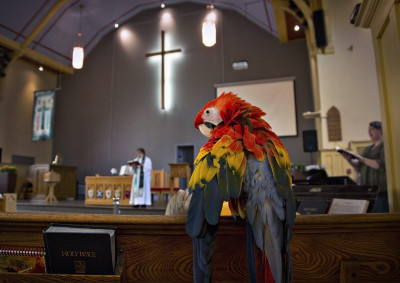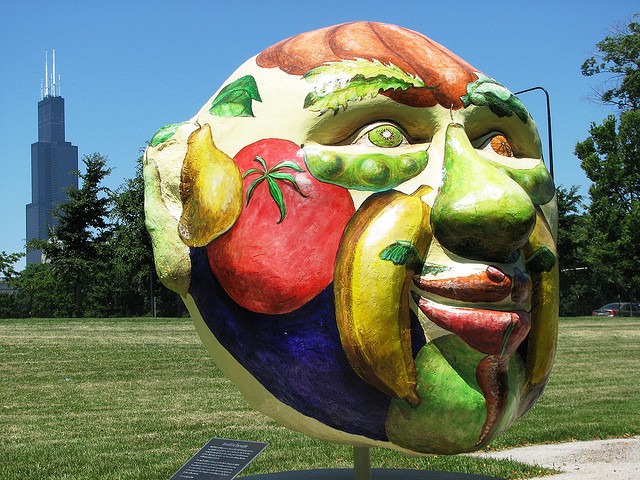There’s a question that keeps coming up time and again: What does the Bible say about consuming animals? Is it biblical or is it the opposite? Did God create animals to be our companions or to end up on a plate? If the Bible advocates a vegan lifestyle, should all Christians go vegan then? These questions gained new momentum after Franklin Graham, the son of pastor Billy Graham, announced on his Facebook page that he had decided to go vegan starting out on January 1. In fact, Christians should be the best advocates of a cruelty-free life and the strongest opponents of the mistreatment of animals. Read on to learn about what the Bible says about the vegan lifestyle!
Franklin Graham, the son of pastor Billy Graham and heir to his evangelical empire, has gone vegan.
That’s right: Perhaps the US’s best-known evangelical leader has stopped consuming animal products. If that statement seems too outrageous to be believed, see his Facebook announcement for yourself.
What brought about such a change in the man who will lead a prayer at Donald Trump’s inauguration? Almost all of what he discussed in his original announcement, and his follow-up tweets, has to do with his health. And this is a very sound strategy: A plant-based diet is tremendous as a bulwark against everything from cancer to heart disease. Graham also invoked the Bible in his Facebook statement, pointing out that when “Daniel went on a complete vegetable diet and after 10 days his appearance was better than the others who hadn’t.”
But the Bible has even more interesting things to say about animal products and our eating habits.
Someone whose likeness has appeared on a PETA advertisement, Pope Benedict XVI, invoked Sacred Scripture when he told a journalist in 2002 that “degrading of living creatures to a commodity seems to me in fact to contradict the relationship of mutuality that comes across in the Bible.”
The “mutuality” to which Pope Benedict XVI referred to comes across clearly in the first books of the Bible. I often tell my theology students that Genesis 1 and 2 are among the best pro-animal texts we could ever imagine there being. Nonhuman animals and humans are created on the same day of creation. Both share the breath of life. God commands humans to eat plants. Animals are brought to Adam, not to kill and eat, but “because it is not good man should be alone.” The fact that Eve is latter found to be the “suitable partner” does not change the fact that God brought the animals to Adam to be his companions.
It is true that in the biblical narrative God gives Noah and his descendants (limited) permission to eat meat, though this notably occurs after sin enters the order of creation. Yet the clear standard of the Kingdom of God (that is, the world God intended for His creations) nevertheless remains one of nonviolence — between humans and humans, yes, but also with all of creation. None “will hurt or destroy” on God’s Holy Mountain, predicted the prophet Isaiah, and this means that lambs will lying down with lions and babies hanging out with poisonous snakes. And it is the intended order of creation that Christians should always seek to emulate.
For much of Christian history, the “new heavens and a new earth” discussed in so much of the New Testament were thought to include nonhuman animals. Pope Francis has said — both in off the cuff remarks and in binding papal documents — that the afterlife will be experienced by our fellow creatures. In his encyclical Laudato Si’, Francis insists that “Eternal life will be a shared experience of awe, in which each creature, resplendently transfigured, will take its rightful place and have something to give those poor men and women who will have been liberated once and for all.”
Interestingly, traditional divine liturgies in the Eastern Orthodox church — trying as best they can to witness to the Kingdom of God — have refused to use animal products in the sanctuary, aside from wool and beeswax.
The implications of the theological fact that nonhuman animals belong to God, and not to humans, were much more clear to the early Christians than it is to us today. Yet the animals we eat today are generally thought of as just another thing to be produced, bought, and consumed. Owners of monstrous factory farms think of little besides maximizing “protein units per square foot” (and, by extension, profits for shareholders) with predictably horrible results for God’s hapless creatures.
But many different kinds of Christians are beginning to recover a more conservative view of nonhuman animals — one which honors the Bible and traditional Christianity over our current practice of sacrificing billions of animals to the idol of consumerism.
The faith outreach office of the Humane Society of the United States, for instance, was able to gather high profile Evangelicals to sign the “Every Living Thing” statement. President of the Ethics and Religious Liberty Commission, Russell Moore, signed the statement and noted, “ … we, as Christians, ought to be the most, of all people, opposed to cruelty or mistreatment of animals …. We should be the people, because we’re formed and shaped by the Bible, who call the consciences of those around us to care about responsible treatment of animals.”
That statement grew into a book project which I contributed to by writing one of its two forewards; the other was written by Karen Swallow Prior, an Evangelical and professor at Liberty University. A stalwart pro-life activist, she has also done more than almost anyone in demonstrating how Evangelicals in early 19th century England (like William Wilberforce and Hannah More) were some of the earliest advocates for animal protection.
Is Franklin Graham directing his life to reflect this traditionally-Christian concern for animals? Refusing to eat them for health reasons is a good start, but a recent tweet by Graham hints that more may be going on here. It displays the photo of a pig’s head and its half-eaten carcass with the line, “Can you believe I used to eat this?”
Yes, I can. But I welcome the exponentially growing number of Christians who refuse to do so any longer.
Source: washingtonpost.com!








Well they all believe in Thou Shalt Not Kill, don’t they ??
Dean Gestal some interesting thoughts in there
At last!
Annabelle Heady Garces
The bible also said, that we should eat in moderation, but understand that the Bible is written en rewritten many moons ago, there were no stores, no animal cruelty and so fourth, people had to survive but that is not the case now, we have access to everything, we just should not use any animal product, if we do than we are as guilty als the people who breed this animals in horrible surcumstances just for making more money. I am 100% vegan, I even not use honey or wool, nothing of what belongs to the animals, bees get smoked out for the honey, many died, sheep get shaved till they bleeding, nope, no animal product in our bodies and house.
Jill Longo Pilkington
Compassion for ALL, right?
Kayley Roberts and Chelsea Roberts and family…..a must read! xx
Bronwyn, AlanWesley.
What’s your opinion on this?
Keep your opinions to yourself
I remember reading that if one finds it in their consciousness to be vegan then they have to. If not there was a whole list of clean and unclean foods, Most meat or seafood sold in stores in considered unclean according to the bible. It also states if anyone is offended by eating meat you can not eat it. You must eat the vegetarian instead. Just got to read the book. Its not complex.
I’m glad that he is going vegan, I also believe we should be cruelty free to animals. Is this the same preacher that is spending millions of dollars on gun training so that they can kill people if they feel the need to? If so, I’m really confused about his cruelty free theology.
Of course!! All the Christians, all the Muslims, all the …Everybody!
Luv Franklin Graham – he is a great man as is his dad Billy Graham. This is very interesting & I agree with him
Heavenly Father gave Moses people quail to eat and he has given other rules on eating,trying to make more or less than this does not show respect for God!
Billy Graham is wonderful, I agree. Wish I could have seen him preach in person!
yes
Heather I need to read this Xxx
In short Jesus Christ was not a Vegan. He caught and ate fish. He fed the 5,000 with bread and fish. He shared the story of the prodigal son and the celebration meal is included in that story. Who do I follow? Jesus Christ of course. If a Vegan diet is needed for health reasons that is good, and I think Franklin Graham is adjusting his diet for health reasons.
I might add I am keen to see farming practice that is sustainable and ethical with all of us being good stewards of the creation God has given us.
That’s great, but Graham has also said horrible things about Muslims & gay people. So he may be enlightened on some issues, but not all.
Many so called “Christians” are also huge Trump supporters…which means respect for life as long as you are born very “white” and heterosexual. I would love to think the church will promote a vegan lifestyle but I highly doubt the idea will be promoted or supported.
Anybody that has ever been suppressed, exploited, made ‘less than’ because of their race, religion, sex, sexual orientation etc should know better than to inflict the same atrocities upon animals through their dietary choices etc. if they suffered,are outraged, hurt, indignant, angered, frustrated about the harm inflicted upon themselves and their ilk, how can they participate in any way whatsoever in the animal holocaust?? How can they in true conscience not be vegan??
He gave them quail as a punishment for their ingratitude.So many of them died afterwards.
Josh Schmidt
So happy to see the story of Daniel in there, “he ate an all vegetable diet, after ten days he looked healthier than those who ate the meat”